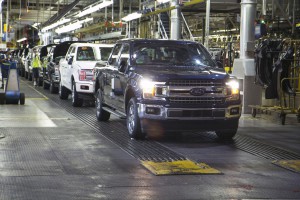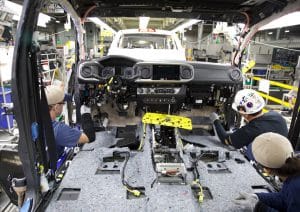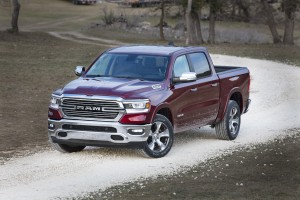
Three automakers are still assessing how their truck production will be impacted as BorgWarner, a supplier of transfer cases, works to determine how long it will take to restart operations at a South Carolina plant damaged by a tornado last week.
The automakers – Ford, Fiat Chrysler and Toyota – are in the midst of determining when they can restart production of plants across the U.S. during the coronavirus pandemic. They could be delayed further, depending upon how long it takes to get the Seneca, South Carolina facility up and running.
BorgWarner officials have yet to offer an official estimate for when that may happen, saying only the company is focused on rebuilding the plants and equipment while developing a contingency plan for providing products if their timeline for either rebuilding or restarting under state restrictions doesn’t match their customers.
(Volkswagen preparing to restart its Chattanooga plant.)
The plant was struck by the tornado during a series of storms on April 13. Due to the stay-at-home rules mandated by the state of South Carolina, the facility was largely empty, although one employee was killed.

Of the three automakers, Ford is the most dependent upon its truck sales and, by extension, could be suffer the biggest negative impact. In fact, the potential was high enough that the automaker warned shareholders with a Securities and Exchange Commission filing about the possibility.
“Currently, the time to resume operations, partially or in full, cannot be estimated, and we have not yet determined the full impacts to our financial position, results of operations, or cash flows, including the timing of those impacts,” the SEC filing said.
Ford initially planned to restart truck production on April 29, but that’s already been pushed off to “indefinitely.” Mike Levine, Ford North America Product Communications manager, told USA Today that no plans about new vehicles, i.e. new trucks, will be revealed until all of its plants are back up and running.
(U.S. new car market showing signs of bouncing back to life.)
Meanwhile, Fiat Chrysler extended its shutdowns through May 6 and Toyota plans to resume production on May 4 at its U.S., Mexico, and Canada facilities. The BorgWarner plant produces transfer cases for the Ford F-150 and Super Duty as well as the Expedition, Explorer, Transit van, Lincoln Navigator and Aviator.; the Ram 1500; and the Toyota Tundra.
A transfer case transfers power from the transmission to the front and rear axles through drive shafts and is essential on four-wheel-drive vehicles.

Fortunately for the automakers, the problem could be worse — especially Ford. History shows that it only takes a problem at one plant to put the automaker in a bind. A fire at Meridian Magnesium Products on May 2, 2018, shutdown Ford’s two full-size truck plants (Dearborn, Michigan and Kansas City, Missouri) idling more than 7,500 workers for a week as the automaker and supplier scrambled to resource the components.
The fire also halted production at the Mercedes-Benz plant in Alabama, General Motors’s full-size van plant near St. Louis and Fiat Chrysler adjusted the run rate of its minivan plant in Windsor, Ontario. Ford customers were ultimately unaffected by the fire as it didn’t have a substantive impact on the automaker’s truck supply.
(As predicted, Ford resumes F-150 production in Michigan.)
However, auto sales are at unprecedented lows due to the coronavirus pandemic, making it easier for Ford – and the others – to be without the transfer cases.








Other than that Mrs. Lincoln, how did you enjoy the play?